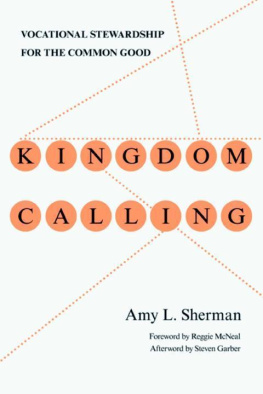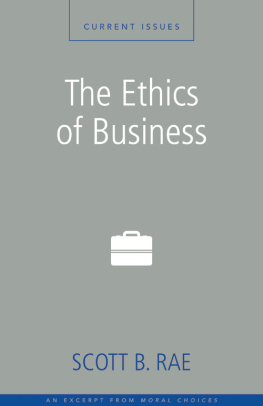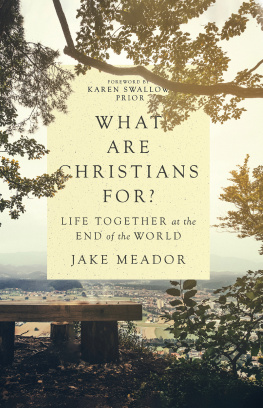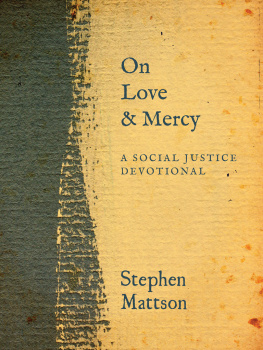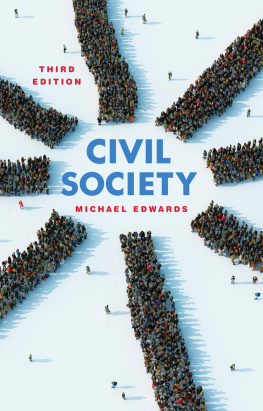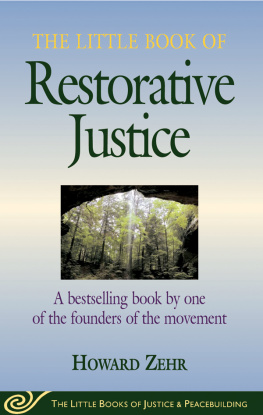Sommaire
Pagination de l'dition papier
Guide
Amy L. Sherman
InterVarsity Press
P.O. Box 1400, Downers Grove, IL 60515-1426
ivpress.com
2022 by Amy L. Sherman
All rights reserved. No part of this book may be reproduced in any form without written permission from InterVarsity Press.
InterVarsity Pressis the book-publishing division of InterVarsity Christian Fellowship/USA, a movement of students and faculty active on campus at hundreds of universities, colleges, and schools of nursing in the United States of America, and a member movement of the International Fellowship of Evangelical Students. For information about local and regional activities, visit intervarsity.org.
All Scripture quotations, unless otherwise indicated, are taken from The Holy Bible, New International Version, NIV. Copyright 1973, 1978, 1984, 2011 by Biblica, Inc.Used by permission of Zondervan. All rights reserved worldwide. www.zondervan.com. The NIV and New International Version are trademarks registered in the United States Patent and Trademark Office by Biblica, Inc.
While any stories in this book are true, some names and identifying information may have been changed to protect the privacy of individuals.
adapted from Thriving Cities Group. Used by permission.
based on Bob Robinson, 2013. Used by permission.
, Four Chapters, copyright by Noelle Stoffel. Used by permission.
Figure 8.1 based on Howard Zehr and Ted Grimsrud, Rethinking God, Justice, and Treatment of Offenders, in Religion, the Community, and the Rehabilitation of Criminal Offenders (Philadelphia: Haworth Press, 2002), 259-85.
based on Chuck Proudfit, 2020. Used by permission.
adapted from Thriving Cities Group, Citizen Field Guide, 2016, 11. Used by permission.
The publisher cannot verify the accuracy or functionality of website URLs used in this book beyond the date of publication.
Cover design and image composite: David Fassett
Images: green Marian plum leaves: Bebenjy / iStock / Getty Images Plus
sun and sunbeams: Jutta Kuss / Getty Images
white pearl textured paper: tomograf / E+ / Getty Images
bird of paradise flower: Vac1 / iStock / Getty Images Pluswatercolor background blue white: Vesin_Sergey / iStock / Getty Images Plus
ISBN 978-1-5140-0079-3 (digital)
ISBN 978-1-5140-0078-6 (print)
This digital document has been produced by Nord Compo.
FOR BARB, DEBBIE, ELLEN, AND ERIC:
without your support, this would have been impossible
Introduction
MY HOPE IN THIS BOOK is to help pastors and Christian leaders live deeply and wisely into the call of Jeremiah 29:7: Seek the peace and prosperity of the city to which I have carried you into exile. Pray to the LORD for it, because if it prospers, you too will prosper.
Im glad whenever I see this notion emblazoned on a congregations home page. I smile when a Christian businessperson, architect, or artist references the verse as inspiration for their work. In a time when there is much to lament about the church in America, I am encouraged by the city gospel movement that has unfolded over the past couple of decades. This movement embraces Jeremiah 29:7 as something of a theme verse. It is composed of a significant (and I hope growing) portion of the church that has accepted the reality of our exilic position in post-Christian culture. These congregations and their leaders are not trying to wield the tools of cultural warfare or put their hopes in political power. They have recognized the ugliness and failure of this strategyand, more importantly, have seen how it is a betrayal of the way of Jesus in the world. They are instead seeking (in the phrases commonly deployed) to engage in gospel renewal in cities, to be a faithful presence, to be missional, or to live as a sign, instrument, and foretaste of the kingdom of God in their communities.
This is a cause for celebration. The reality of it has helped keep me devoted to the bride of Christ during a season when many media portrayals of the church have highlighted the distortions of a strident Christian nationalism whose visibility has increased in the past few years.
RESPONDING TO EXILE
Ive written this book for those Christ-followers who have found in Jeremiahs words a compelling vision for the church in our time and for those who are open to this idea. Like the Israelites in Babylon at the time of Jeremiahs letter, we, too, are in exile.
We are generally in exile in the sense that all of humanity has been in exile since human beings were sent out of the Garden of Eden because of our sin. All of humanity longs to be back home, though some people are more willing to admit it than others. Christs disciples experience a further dimension of exile. We are members of a kingdom that Jesus taught was not of this world (Jn 18:36). We are exiles scattered throughout the nations (1 Pet 1:1). We feel uncomfortable with all kinds of worldliness because weve been made new creatures in Christ. We are trying to obey the command to not conform to the pattern of this world, but be transformed by the renewing of [our] mind[s] (Rom 12:2).
As Christians in post-Christian America, we feel keenly a specific sense of exile, perhaps similar to the Israelites in pagan Babylon. Were experiencing dislocation because, increasingly, our basic convictions about God, truth, nature, and human nature are unintelligible to our fellow citizens. We feel dismayed by the cultures moral relativism. In our workplaces some of us experience disdain or hostility toward our Christian faith. Older believers in particular remember a time when mainstream culture seemed more in alignment with traditional biblical values. As Bible Society CEO Paul Williams writes, We live in a generation in which our elders at least can remember a time when Christianity was still a major force in our Western or Western-influenced societies. Thus we feel its declining influence more acutely.
This disorientation has prompted a variety of opinions about how to respond, with some favoring retreat and others attack. I think many Christ-followers in the United States today feel caught. They are disturbed by the aggressive culture-warrior stance of some within conservative Christianity and with this groups seemingly uncritical marriage to right-wing politics. They grasp that Christendom is gone and that the church today must find a new way to be in our current culture. They also sense that it is important to stand up for their moral commitments, to be brave enough to insist on true truths. They dont want to attack, but they dont want to capitulate either, giving in to a version of political correctness that derides basic biblical teachings on such topics as gender or marriage.
Into this context the words from Jeremiah land with freshness and challenge. Rather than trying to conquer the world around us and rather than giving in and accommodating to its values and agendas, we hear Gods call to engage this world. Its a call to be, in Timothy Kellers memorable phrase, a counterculture for the common good. It involves dwelling in the land, not withdrawing from it. It involves maintaining faithfulness to our distinct, biblical convictions while simultaneously laying down our lives for our neighborssome of whom ridicule and reject those very convictions. It involves trusting God, who showed us grace while we were his enemies, when he says that this path of sacrificial love can bring both us and them true flourishing.


